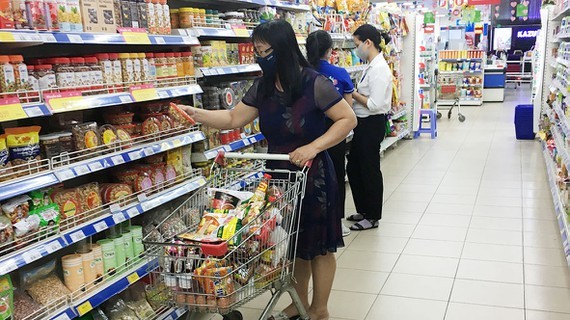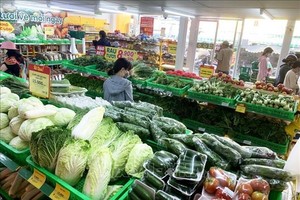
In the market, some retail distributors have emerged, including both domestic and foreign enterprises that are holding the major market share, competing with each other, and leading in new retail trends. Large corporations, namely Lotte, Central Group, Aeon, Circle K, K Mart, Auchan, and Family Mart have continuously promoted strategies to penetrate and expand the retail market in Vietnam.
With the increasing speed of penetration and expansion, foreign enterprises have caused great pressure and been a threat to domestic retailers. Many domestically-produced goods have seen a decline in market share, especially for the high-end customer segment, there are no signs of Vietnamese brands. Large foreign enterprises have continuously increased their market share and it is forecasted that it is likely to increase swiftly in the future.
When the Vietnam - EU Free Trade Agreement (EVFTA) comes into effect, the commitment to open the service, investment, and distribution markets is also the reason that makes many big enterprises of the EU’s members promote their investment in the distribution and retail industry in Vietnam. Meanwhile, most Vietnamese enterprises are small and medium-sized enterprises with limited resources. Only a few large Vietnamese enterprises such as Saigon Co.op, VinCommerce, Thegioididong, Bach Hoa Xanh, Satra, and BRG Retail are capable of competing and affirming their positions in Vietnam's retail market.
Under the pressure that in international economic integration, the domestic market must be opened following the commitments of signed free trade agreements and the upcoming EVFTA. This has led to strong penetration of foreign enterprises to expand the retail chains in Vietnam, imposing great challenges, requiring authorities to make timely decisions to develop the retail market, in particular, and the domestic market, in general, amid the new context.
To resolve the challenges and benefit from the EVFTA, the Domestic Market Department under the Ministry of Industry and Trade has made some recommendations for small and medium-sized enterprises operating in the distribution sector. Specifically, domestic enterprises need to strengthen connection and cooperation with many domestic and foreign partners to take advantage of technology, management, and the market to increase their ability to participate in value chains; cooperate with manufacturers, create friendly, trustworthy, and reliable relationships with customers through participating in production networks and supply chains from domestic to regional and global to improve quality, added-value, and competitiveness of enterprises in the market.
Along with that, domestic enterprises need to strengthen corporate strategic management, effectively implement the building and adjustment of business strategies and structures in accordance with domestic and international market conditions, meeting the more and more diverse and higher needs of consumers; improve the quality of retail services on the basis of research and application of modern retail technology and advanced business management methods; promote market research and product marketing; integrate information about consumers both offline and online to manage customer relationship effectively; strengthen trade promotion activities, develop and promote enterprises' brand names on internet channels, mobile phones, and social networks; carry out the identification and finalization of geographical indications and origins of Vietnamese goods and products to take advantage of the opportunities to promote exports to the market of member countries in the FTAs; diversify and develop multi-channel retail to avoid risks and improve business performance.
At the same time, they should focus on developing human resources of enterprises to meet the requirements of retail business in the fourth industrial revolution; strengthening the implementation of corporate social responsibility, meeting consumers' increasing demands for environmental protection, safety, public health, and improving the quality of life.
With the increasing speed of penetration and expansion, foreign enterprises have caused great pressure and been a threat to domestic retailers. Many domestically-produced goods have seen a decline in market share, especially for the high-end customer segment, there are no signs of Vietnamese brands. Large foreign enterprises have continuously increased their market share and it is forecasted that it is likely to increase swiftly in the future.
When the Vietnam - EU Free Trade Agreement (EVFTA) comes into effect, the commitment to open the service, investment, and distribution markets is also the reason that makes many big enterprises of the EU’s members promote their investment in the distribution and retail industry in Vietnam. Meanwhile, most Vietnamese enterprises are small and medium-sized enterprises with limited resources. Only a few large Vietnamese enterprises such as Saigon Co.op, VinCommerce, Thegioididong, Bach Hoa Xanh, Satra, and BRG Retail are capable of competing and affirming their positions in Vietnam's retail market.
Under the pressure that in international economic integration, the domestic market must be opened following the commitments of signed free trade agreements and the upcoming EVFTA. This has led to strong penetration of foreign enterprises to expand the retail chains in Vietnam, imposing great challenges, requiring authorities to make timely decisions to develop the retail market, in particular, and the domestic market, in general, amid the new context.
To resolve the challenges and benefit from the EVFTA, the Domestic Market Department under the Ministry of Industry and Trade has made some recommendations for small and medium-sized enterprises operating in the distribution sector. Specifically, domestic enterprises need to strengthen connection and cooperation with many domestic and foreign partners to take advantage of technology, management, and the market to increase their ability to participate in value chains; cooperate with manufacturers, create friendly, trustworthy, and reliable relationships with customers through participating in production networks and supply chains from domestic to regional and global to improve quality, added-value, and competitiveness of enterprises in the market.
Along with that, domestic enterprises need to strengthen corporate strategic management, effectively implement the building and adjustment of business strategies and structures in accordance with domestic and international market conditions, meeting the more and more diverse and higher needs of consumers; improve the quality of retail services on the basis of research and application of modern retail technology and advanced business management methods; promote market research and product marketing; integrate information about consumers both offline and online to manage customer relationship effectively; strengthen trade promotion activities, develop and promote enterprises' brand names on internet channels, mobile phones, and social networks; carry out the identification and finalization of geographical indications and origins of Vietnamese goods and products to take advantage of the opportunities to promote exports to the market of member countries in the FTAs; diversify and develop multi-channel retail to avoid risks and improve business performance.
At the same time, they should focus on developing human resources of enterprises to meet the requirements of retail business in the fourth industrial revolution; strengthening the implementation of corporate social responsibility, meeting consumers' increasing demands for environmental protection, safety, public health, and improving the quality of life.
























